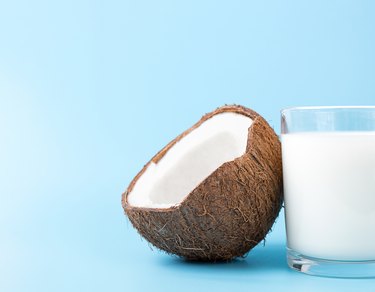
It must be tropical island time. Fans of coconut tout it as a superfood because of its unique fats and antioxidants — and coconut milk is a tasty way to consume it. However, if you're considering drinking coconut milk for cancer prevention, you should know it has some pros and cons.
Read more: 5 Health Benefits of Coconut Milk and How to Use It
Video of the Day
Video of the Day
What Is Coconut Milk?
Coconut milk is a popular non-dairy beverage and a common ingredient in Asian cooking. It's made from the meat of mature coconuts. Unlike coconut water, though, it doesn't occur naturally. It's made by grating coconut meat, blending it with water, and then straining the mixture to remove any solids. Sometimes sweeteners, thickeners or other ingredients are added.
Canned coconut milk is used in cooking to impart a sweet, tropical flavor to dishes. According to the USDA, one cup provides:
- Calories: 552.
- Protein: 6 grams.
- Carbs: 13 grams.
- Fat: 57 grams.
- Saturated fat: 51 grams.
Coconut milk is also available as a plant-based milk beverage. According to the USDA, one cup provides:
- Calories: 101.
- Protein: 0 grams.
- Carbs: 14 grams.
- Fat: 5 grams.
- Saturated fat: 3 grams.
Coconut milk beverage contains less coconut and more water, which is why it's significantly lower in fat and calories than canned coconut milk.
Coconut Milk’s Benefits and Side Effects
As a fruit, coconuts provide a range of beneficial nutrients. A study published in August 2020 in the International Journal of Food Science (IJFS) found that coconut milk contains phenolic compounds, powerful antioxidants that protect your DNA from oxidative damage that can potentially lead to cancer.
However, coconuts are also very high in saturated fat. The American Heart Association (AHA) notes that the oil in coconuts is about 82 percent saturated. It recommends limiting saturated fats from both animal and plant sources because they can raise LDL (bad) cholesterol and promote heart disease. The National Cancer Institute (NCI) also cautions that some types of cancer are linked with eating more saturated fat.
Not all saturated fats are equal, though. The IJFS authors identified a high percentage of medium-chain triglyceride (MCT) saturated fats in coconut milk. MCTs are metabolized differently compared to long-chain triglyceride fats. Some research suggests they may have health benefits and promote weight loss. However, the AHA disagrees, stating that several studies on MCT fats haven't shown benefits.
Read more: Can Coconut Milk Increase Cholesterol?
Coconut Milk and Cancer
There's no concrete evidence that coconut milk prevents or cures cancer. But there are a few lab studies that suggest possible benefits from some of the compounds in coconut.
One, published in September 2017 in the journal Cell Death Discovery, looked at the effects of lauric acid (the main MCT fat in coconut) on breast and endometrial cancer cells. Researchers found that lauric acid caused apoptosis, or cell death, in the cancer cells.
Another study, published in April 2014 in the International Food Research Journal, found similar results, this time showing that polyphenolic antioxidants from coconut killed liver cancer cells in lab tests.
But these lab studies were conducted under controlled conditions, using certain compounds extracted from coconut oil. There's no way to know if drinking coconut milk has the same effect on cancer cells in humans.
Diet patterns that include more plant foods and fewer animal and dairy foods are often recommended both for cancer patients and as a way to reduce cancer risk. However, Kim Dalzell, PhD, RD, a registered dietitian and the founder of the Cancer Nutrition Advisor in Colorado Springs, Colorado, cautions about having too much coconut milk. "Nut milks are a great alternative to cow's milk," she says. "While coconut milk offers a unique flavor for rice dishes or smoothies, it contains saturated fats, so it should be used sparingly."
NCI recommends keeping saturated fat to less than 10 percent of total calories. At 552 calories per cup, as listed by the USDA, coconut milk is a significant source of calories. NCI cautions against excess calorie consumption and lists weight gain as a risk factor for several cancer types.
While coconuts contain compounds that might play a role in reducing the risk of cancer, there's no human research evidence that shows drinking coconut milk by itself will prevent cancer. Based on information from the AHA and NCI, it may be best to use it only occasionally or add it to recipes with other healthy ingredients.
- USDA FoodData Central: “Coconut Milk, Used in Cooking”
- USDA FoodData Central: “Coconut Milk Beverage”
- International Journal of Food Science: “Antioxidant and Nutritional Properties of Domestic and Commercial Coconut Milk Preparations”
- American Heart Association: “Saturated Fats: Why All the Hubbub Over Coconuts?”
- National Cancer Institute: “Fat Consumption”
- Cell Death Discovery: “The Lauric Acid-Activated Signaling Prompts Apoptosis in Cancer Cells”
- International Food Research Journal: “Cytotoxic Activity of the Phenolic Extract of Virgin Coconut Oil on Human Hepatocarcinoma Cells”
- Kim Dalzell, PhD, RD, registered dietitian, founder, Cancer Nutrition Advisor, Colorado Springs, Colorado